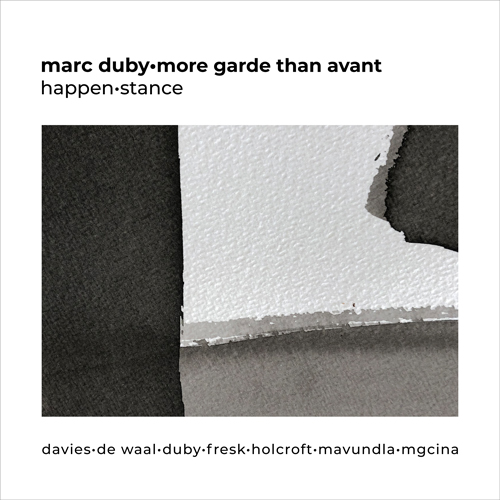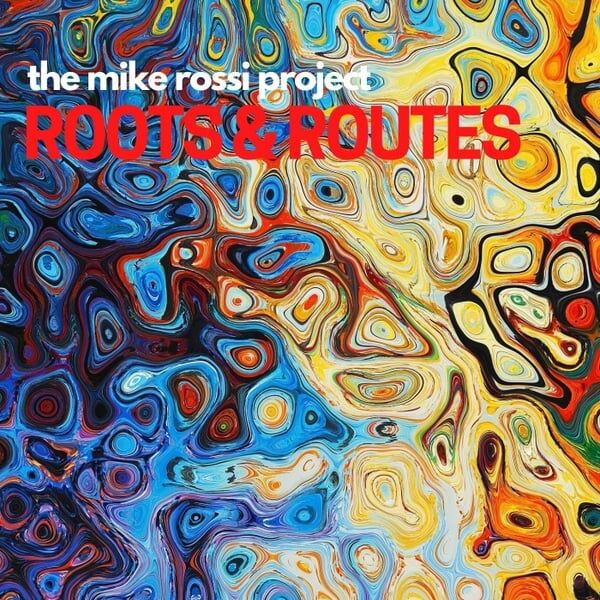So many new albums landed in the final quarter of 2022 that reviewers (including me) are still running to catch up. Among them are a brace from two distinguished jazz teachers: bassist Marc Duby and reedman Mike Rossi.
Duby’s Happen(dot)stance https://music.apple.com/zm/album/happen-stance/1647203349 features an ensemble that harks back to his Durban outfit of the 1970s & early 80s, More Garde than Avant. Duby – now with a day job as a professor of musicology – periodically wheels More Garde… out to bring a collection of musical friends together; you can catch a an earlier edition playing at the Orbit in 2016 here: https://www.facebook.com/theorbitjazzclub/videos/marc-dubys-more-garde-than-avant-in-orbit-with-a-band-featuring-some-great-jazz-/1051524281590509/
This outing features a smaller ensemble than 2016: Duby on bass, Godfrey Mgcina on drums, Hugo de Waal on guitar, John Davies on flugelbone (no, that’s not a typo: it’s the smaller instrument sometimes dubbed a ‘marching trombone’) Yusuf Justin Holcroft on reeds, Sydney Mavundla on trumpet and John Fresk on keys.
That (dot) in the title matters, since several musicians have released dotless albums with the same name, including Mark Buselli, Augustin Lehfuss and, most recently, another South African bassist, Shane Cooper in 2021, with entrancing soundbooks of found and improvised sounds.
The 11 compositions of Duby’s album (the whole outing runs to 80 minutes) are set firmly in the international contemporary jazz mainstream. The mood is mostly reflective and lyrical, with intelligent soloing and empathetic ensemble work – you can hear that these are friends who’ve worked together before and know each others’ moods and sonic shapes. Although there are seven names on the cover, the core of the music is the quartet of bass, drums, piano and reeds. (Davies, who used to be the ubiquitous ‘man with the hat’ on outings like this, makes us wait through several numbers for The Climb to find a stretched out ‘bone solo.)
As you’d expect, there’s accomplished playing from everybody. The easy, lush swing of Holcroft on The Luxury of Choice and the sensitive feel for space of Fresk on Manneland stick in the memory, but there’s way more.
Duby’s presence emerges initially as composer and discreet rhythm accompanist; his bass voice becoming more prominent as the tracks unfold. For me, the high point was his bass voice on the gently catchy Seagull. But you can’t talk about bass without also considering its partnership with drums, and if there was a surprise on the album it was Mgcina. He’s another of those “elder statesmen’ and “stalwarts” who’s always around but rarely written about: a drummer who never intrudes but always facilitates brilliantly. If a first listen to the album inevitably focuses on the soloists and compositions, each subsequent hearing reminds us how much the whole edifice depends on Mgcina’s subtle grounding textures. The witty, twisty, slightly surrealist concluding ensemble march, Le Monocle de Mon Oncle, lets him and everybody else shine.
Another collection of music teachers populate Mike Rossi’s Roots and Routes: https://music.apple.com/gb/album/roots-routes/1654039322 not only the UCT reed prof as leader and main composer, but Mike Campbell on bass, William Haubricht on ‘bone, Blake Hellaby on piano and Kevin Gibson on drums, with Darren English on trumpet and Lilavan Gangen on percussion.
The thematic unifier for the dozen numbers here is Rossi’s travels and encounters (musical and personal), as the album title suggests. The collection revisits three of Rossi’s Italy-inspired melodies, which have always been among my favourites of his compositions, as well as dropping in on Japan and the Rugby World Cup, and paying tribute to Madiba, Bheki Mseleku, Wayne Shorter and – in a tangibly personal, emotional tune – old colleague Darius Brubeck who, at the time For Darius was written, was battling severe Covid. Cape Town gets its nod in Cape Town Jump, dedicated in the liners to “Chris McGregor’s Brotherhood of Breath and the Blue Notes”. However Dudu Pukwana, composer of the Mra theme on which the number rests, is oddly not named in the dedication.
Again, there’s highly accomplished playing on both solos and in ensemble work from everyone concerned, including the leader on a dazzling variety of reeds; again, you can hear how these are players who’ve worked closely together over time and get what the composer and their bandmates want. Hellaby’s solo on For Darius is a particularly sweet nod towards how the song’s subject swings. Brubeck the composer also gets props in the beautifully constructed and joyful closer, Lion at the Bar where, again, Hellaby shines.
It’s also lovely to hear English – these days, often wowing audiences in original contexts outside the mainstream – demonstrating again that he can talk this jazz language too, for example in his witty conversation with Haubricht on Cookin’ in Kanazawa.
As a postscript to this column, the Theatre and Dance Alliance is looking forward (perhaps it’s wishful thinking?) to the prospect of a new Minister of Sport, Arts and Culture in the upcoming Cabinet reshuffle. The have issued a media release explaining why we need a Minister who is accountable, accessible, informed, proactive and involved. Is anybody listening?

